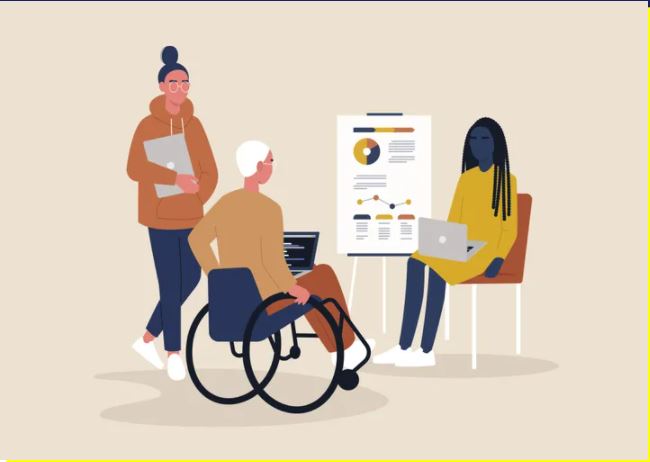Instead Of These Ableist Words, Use Inclusive Language At Work
Monica Torres | Huffington Post, October 14, 2020
Stop using disability as a negative metaphor at work (and everywhere else).

When you talk about something going poorly at work, how do you describe it? Think carefully.
If you say “insane,” “psycho,” “lame,” “moronic,” or “crazy,” that’s ableist.
Ableism could be showing up in your language at work.
Ableism has multiple working definitions. It’s the discrimination and oppression of people with disabilities. One law review journal describes it as the “stereotypes about people with disabilities that acts as a barrier to keep them from achieving their full potential as equal citizens.” And as the late disability activist Stacey Milbern describes it in the video below, ableism is “a system of oppression that favors ablebodied-ness at any cost, frequently at the expense of people with disabilities.”
Ableism is reinforced when terms that refer to abilities are used as pejoratives. Words like “crazy,” for example, perpetuate the false notion that having a mental illness or psychological disability is so horrible and undesirable that it can be used as an insult, as attorney Lydia X. Z. Brown notes in a blog post on the violence of linguistic ableism.
Be careful about the metaphors you use at your workplace, too. Instead of being “crippled” by the amount of work you have to do, consider better alternatives like “frozen by, stopped by, completely stuck,” Brown suggests.
Consider who is in the room when you use metaphors around physical ability. Douglas Kruse, co-director of Rutgers University’s Program for Disability Research, uses a wheelchair and noted that phrases like “let’s all walk over” can be excluding people who do not have that physical ability: “It’s a little odd when we talk about, ‘Let’s all walk over to the student union together.’ Well I’m not walking, but it’s not meant in any hostile way.”
But when words around physical ability are used in a pejorative phrase, it can be seen as hostile. Terms like “blind spot” or metaphors like “falling on deaf ears” can also perpetuate false ideas about what living and working with a disability is like. “People who are blind, for example, do not lack in knowledge; they simply have different ways of obtaining it,” educator Liat Ben-Moshe notes in an essay on disabling language in the classroom.
By using more precise language, you show consideration to your colleagues by not making ableism one more factor they have to deal with on top of deadlines and deliverables. For more examples of words to avoid, check out the longer glossary of ableist language and alternatives that Brown maintains on their blog.
If you call out ableist words, it doesn’t need to be a long conversation.
Lisa Schur, Kruse’s co-director at the Rutgers program, noted that not everyone is in a psychologically safe work environment that enables them to call out instances of ableist language. But if you do feel comfortable challenging it, you can use the script that Schur did when a colleague said an idea was “crazy” during a workshop.
Schur said she raised her hand and said, “’When you use the word crazy, that actually can be hurtful to people who have mental disabilities, who deal with mental illness.′ And that was all I said, and people acknowledged that and moved on.”
By calling it out, you can be an ally for people with disabilities. “Often people with those kinds of [mental or cognitive] disabilities may be reluctant, because it’s calling attention to their specific disability,” Schur said.
And when you’re thinking of using a word like “crazy,” “it’s better to say ‘that just doesn’t make sense’ or something much more neutral,” Kruse said.
About This Article:
A Life Worth Living has copied the content of this article under fair use in order to preserve as a post in our resource library for preservation in accessible format. Explicit permission pending.
Link to Original Article: https://www.huffpost.com/entry/disability-language-work_l_5f85d522c5b681f7da1c3839

